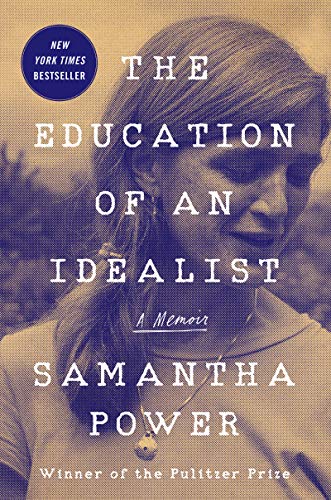The Education of an Idealist: A Memoir

“this is a good read for any empathetic, intellectually alive reader wondering about the world and the meaning of life.”
This is an amazing tale—a veritable profile of courage plus persistence. An immigrant from Ireland, haunted by her affectionate ties to an alcoholic father left behind, becomes a friend and counselor to Senator Barack Obama and then President Obama’s ambassador to the United Nations.
In her thirties she finally links up with and marries a kindred soul (one quite different from her Guinness-fed father) and bears him two children. After Obama leaves the White House, she writes Education of an Idealist as a professor at the Harvard Law School and Harvard’s Kennedy School of Government, where she teaches about her life-long concerns with human rights.
The book educates the reader about multiple crises in world affairs and how an idealist comes to think about and deal with them—first as a journalist and academic and then as a practitioner enmeshed in the complexities of Washington and UN realities.
Power has written and co-edited several books, but she won the Pulitzer Prize in 2003 for her A Problem from Hell: America in the Age of Genocide. A chapter in this book details the hard work and difficulties that preceded its publication. Having learned about genocide close up in Bosnia as a journalist, while still a student at Harvard Law School, she went on to research U.S. government responses to the Armenian and other genocides. The usual reaction: “Very nasty but better not to get involved.” She wonders why American leaders often vow "never again" but usually do nothing to stop or even condemn genocide.
When Power learned in 1994 about ethnic massacres in Rwanda, she labored for five years to produce a book that analyzed genocides not just in Bosnia and Rwanda but also in Cambodia, Iraq, and Kosovo. She examined and uncovered official documents and interviewed hundreds of victims and knowledgeable observers. An editor at Random House encouraged this work, but by the time the 600-plus-page manuscript was drafted, he had left. Despite the efforts of an able agent, many other publishers also rejected the project. Thanks to the owner of The New Republic, A Problem from Hell was published and then won the Pulitzer for nonfiction.
Early in Education of an Idealist we find Samantha in Ireland, starting at age five, sitting in the basement of her father’s favorite pub, Hartigan’s, coloring pictures or reading detective stories and getting accustomed to chatting with a variety of unusual personalities who pass by—all good training for a future journalist and historian.
Some 30 years later she and her husband, Cass Sunstein, return to the same pub and ask a bar attendant if she remembers Jim Power (her long deceased father). “Hello, Samantha,” the woman replies—remembering the child’s name from a distant past (perhaps buttressed by media coverage of Power’s latest book). “Why did he die?” Samantha asks. “Because you left,” was her answer.
Besides what this book reveals about Samantha and her family, the book includes many passages where Barack Obama, even while concerned with his presidency, goes out of his way to telephone or email Samantha when he knows she is in distress. These episodes convey another aspect of a man often portrayed as brilliant but cold.
Who may (or should) be interested in this book?
1. Idealists who wish to persevere even when practical people say such struggles are naïve and futile.
2. Realists who underestimate the influence the potential influence of ideals and values in world affairs and in one’s daily life.
3. Anyone caught in a bureaucracy (as in the White House) where new ideas conflict with familiar patterns and may challenge existing authority and provoke jealousy and backbiting.
4. Writers and other artists facing one rejection after another.
5. Persons who enjoy a laugh and doing (or watching) sports even when dealing with physical pain and fatigue as they wrestle with professional disappointments and evil in the world.
6. Family members of addicts who love and want to help them but who seek also to lead their own lives.
7. Feminists who confront glass ceilings established and maintained by a male-dominated society.
8. Parents who love and cherish their children and interact with them in the midst of busy professional lives.
9. All those facing family and other tragedies: "The people we love are the foundation for all else"—a lesson that came to the fore when Power’s husband suffered an accident.
10. Readers who enjoy a good laugh from the funny happenings a good writer recounts as she narrates heavy-duty events.
In short, this is a good read for any empathetic, intellectually alive reader wondering about the world and the meaning of life.
Who knows what the future may bring? In September 2019 Power told CBS that President Donald Trump has threatened America's leadership in the world, and that it will be very hard for the nation to recover from his presidency. Asked in early October 2019 if she would consider running for Elizabeth Warren’s Senate seat if Warren became president, Power replied, “No, no. I don’t think it’s a good idea to rule anything out.” But the ex-diplomat and sports fan also told the Boston Globe, that she “wouldn’t rule out managing the Red Sox.”